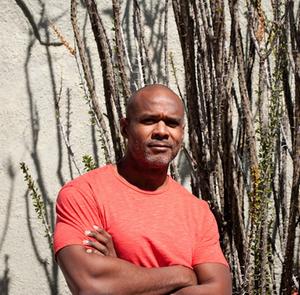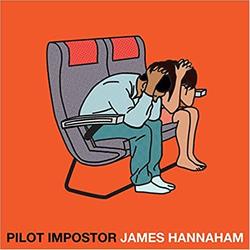
|
|
| photo: Hannah Ensor | |
James Hannaham's novel Delicious Foods won the PEN/Faulkner and Hurston/Wright Legacy Awards, and his novel God Says No was honored by the ALA's Stonewall Book Awards. His short stories have appeared in One Story, Fence, StoryQuarterly and BOMB; he was for many years a writer for the Village Voice and Salon and is also a visual and performance artist. He teaches at the Pratt Institute, and lives in Brooklyn, N.Y..
His book Pilot Impostor (Soft Skull Press, November 30, 2021) draws on the poetry of Fernando Pessoa and the history of air disasters to investigate con men, identity politics, failures of leadership, the privilege of ineptitude, the slave trade and the nature of consciousness.
On your nightstand now:
Things that are literally on my nightstand are actually less likely to get read. Most of those books have been there for years. I'd be embarrassed to list them. On my desk near my laptop is the pile I'm most likely to choose from next: András Forgách, No Live Files Remain,a novel by a Hungarian writer based on the real experience of having discovered that his mother was a government informant;Yaa Gyasi, Transcendent Kingdom; and Clarice Lispector, The Hour of the Star.
But now I have to read books for classes I'm teaching so I'm reading the 1818 Frankenstein for the first time, which is impossible to see clearly given how many perversions of that text I have already encountered. I'm finding it hard to read that long, bizarrely articulate monologue by the creature in the middle section without thinking of the voice of Fred Gwynne as Herman Munster speaking it. Also, it occurred to me that the speech must also have been in German or French, far more sophisticated than the public image of the creature. But it's a classic father/son story, I guess.
Favorite book when you were a child:
The Phantom Tollbooth by Norton Juster.
Your top five authors:
I'm not sure what that's supposed to mean. I'm supposed to rank authors in terms of how much I like them? How much they've influenced me? How close I am to them? How much good advice they have given me? How frequently I rip them off? If I'm gonna be real, the list would look like this no matter the criteria: Jennifer Egan, Jennifer Egan, Jennifer Egan, Jennifer Egan and Jennifer Egan. But here are my top five authors who are my friends right now: Rye Curtis (Kingdomtide), Joshua Furst (Revolutionaries), Adaobi Tricia Nwaubani (Buried Beneath the Baobab Tree), Jason Porter (Why Are You So Sad), Martha Southgate (The Taste of Salt), Anna Moschovakis (Eleanor, Or The Rejection of the Progress of Love), Monique Truong (The Sweetest Fruits)--oops, that's seven.
Book you've faked reading:
John Steinbeck's Tortilla Flat, but that was eighth grade, and I only faked finishing it. I got in trouble for having tried to write a book report on it anyway. The teacher--I had a lot of conflict with English teachers over the years--was this woman who insisted on a weird kind of loyalty test at the beginning of her class. She demanded that everyone in her class kiss her on the cheek. I refused, and somehow it became a very big deal. It's faintly gratifying to know that in today's world, she'd get fired for a stunt like that. When I faked the book report, she made me write a letter--to my mom, I think--confessing to my crime, which I tried to turn into a poem, which she forbade. I don't remember my mother being upset. She was always in my corner. Especially with the kissing requirement, which she agreed was really weird.
 Book(s) you're an evangelist for:
Book(s) you're an evangelist for:
No One Writes Back by Jang Eun-Jin. Our Twisted Hero by Yi Mun-Yol. Modern Korean lit generally. My Happy Life by Lydia Millet. Kingdomtide by Rye Curtis. Both Into the Go-Slow and The World According to Fannie Davis by Bridgett Davis. I would be an evangelist for Tayari Jones, too, but she has a whole religion now.
Book you've bought for the cover:
Cuyahoga by Pete Beatty. It is a great cover, but I thought it was a new book by Paul Beatty that I hadn't heard about. Embarrassking, as Popeye would say.
Book you hid from your parents:
I didn't have to hide books from my mother; she didn't censor her kids' reading, and although my dad did not live with us, he would have supported that. If I was worried that my mother would disapprove of a title, I'd usually have such a huge pile of books that I just could leave it toward the bottom. She wouldn't go through them in the first place, though. She did confiscate a Monty Python record album from me once, which seemed out of character. I had five other Monty Python records that were equally smutty, so it was very confusing that she focused on the one. You didn't ask about magazines, so I will not elaborate, except to say I hid number of issues of Honcho from everyone.
Book that changed your life:
The funny (but true) answer would be to say my own second novel, Delicious Foods, but that is not the kind of answer this question typically means to elicit. So I'll just say something unexpected: Baudelaire's Paris Spleen. Before that book, I thought "prose poem" was an oxymoron.
Favorite line from a book:
The last line of Independent People by Halldór Laxness is very simple, but after having read the epic, it's devastating: "They went on." And a lot of Amy Hempel kickers: "Nothing is a long time ago," from "The Afterlife"; "Fluent now in the language of grief," from "In the Cemetery Where Al Jolson Is Buried." I guess these all rely on having read the story. I tend to dismiss aphorisms and directions for living when I read them in fiction. I dismiss them even harder when I read them on Instagram.
Five books you'll never part with:
Five? I have a hard time parting with ANY books, even books I dislike or have no intention of ever reading. I even have trouble parting with advance reader copies! But again, you might want a more normal answer, though normal is not my shtick, as you might have noticed. My current datebook. Exercises in Style by Raymond Queneau. Blood Dazzler by Patricia Smith. Invisible Man. Do I need to say that it's by Ralph Ellison? Yukio Mishima's Forbidden Colors, or maybe After the Banquet.
Book you most want to read again for the first time:
I'm sorry to focus so much on the construction of these questions, but I sense that this one presumes that everyone has a kind of nostalgia for their early reading experiences, during which their critical abilities were not as good and they could immerse themselves in something without judging from whatever adult angle they might bring now. I have no such nostalgia. I'm far more interested in re-reading things in order to see what I might have missed in the past, to see just how naïve a dope I was, what critical tools I might bring to them now, and how much more far-reaching and nuanced my take on the book might be by comparison. I mean, maybe my new reading wouldn't be any deeper, but I still have no interest in returning to some presumptive state of innocence, especially if it means wiping out what I know now.

